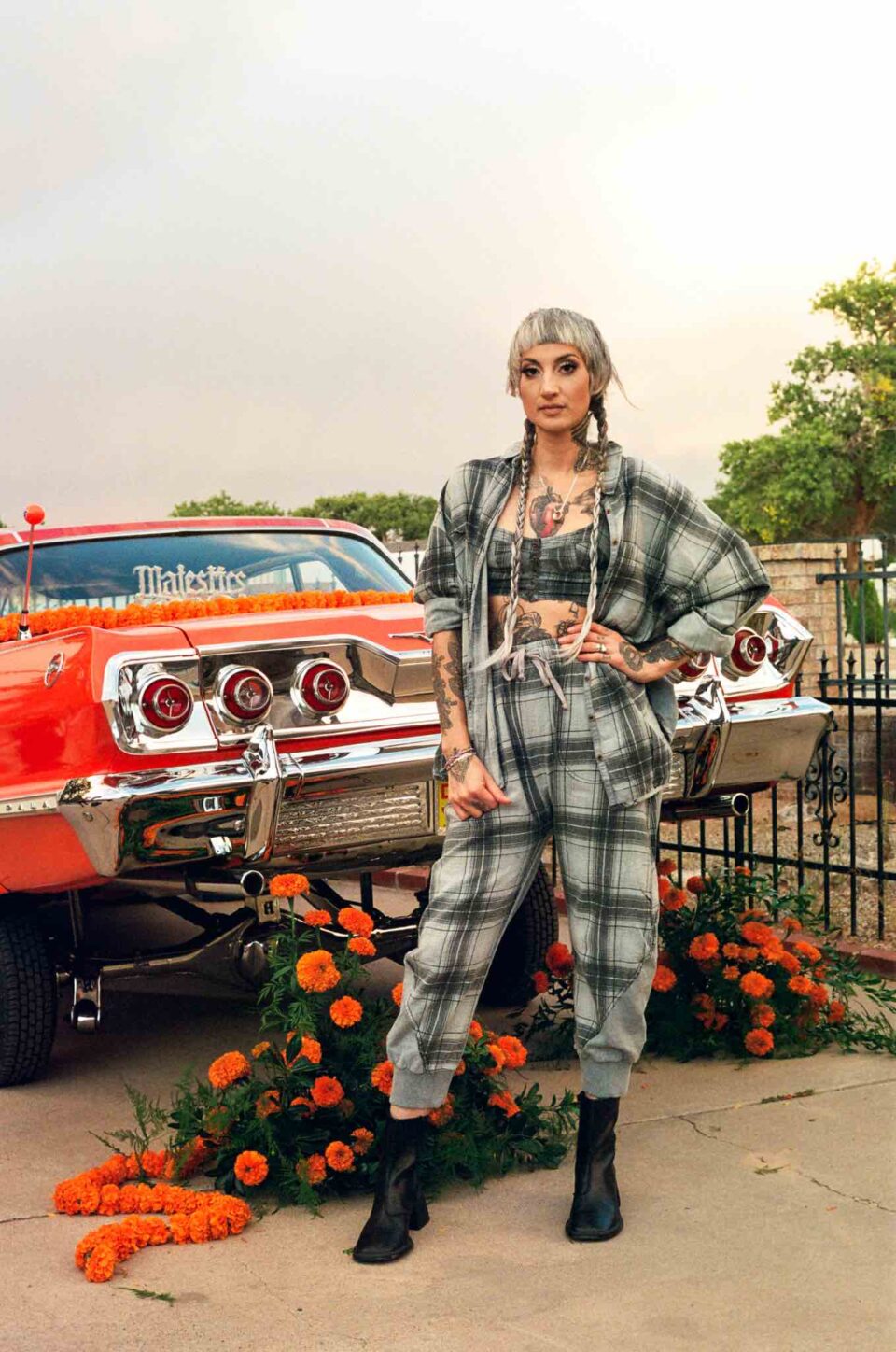Y La Bamba’s new album Lucha (Spanish for “fight”) is the labor of a lifelong journey of healing and self-discovery. It builds on the project’s past output, but the end result is a mellifluous, cohesive statement full of euphonic harmonies, serene Latin beats, and a healthy portion of Luz Elena Mendoza Ramos’s sultry voice singing in both English and Spanish, evoking feelings of tranquility and vulnerability—with a Devendra Banhart feature to boot.
When I talk to Mendoza Ramos over Zoom about Lucha and the personal events surrounding it, I quickly pick up on their directness—they say exactly what’s on their mind. In their experience, music journalists can seem oblivious while covering sensitive topics, so they requested my questions in advance to prepare for our interview so as to not feel overwhelmed by our interaction. “I’m very vulnerable and very stream-of-conscious,” says Mendoza Ramos. “I’ve been asked by white dudes, or just men—and they're good people, but not really understanding the weight of these questions, you know what I mean?”
Born in San Francisco, Mendoza Ramos’s parents migrated from Michoacan, Mexico to Central California in the ’70s and worked in farming while living in migrant camps over the years. Eventually their family moved to Oregon for better paying jobs at the sawmills in the southern part of the state. Around the time the COVID-19 pandemic began, Mendoza Ramos decided to move to Mexico to learn more about where they came from. In Mendoza Ramos’s words, they’re trying to decolonize their mind—a challenging experience for those who have to reckon with both Indigenous and European roots.
Mendoza Ramos recently took a 23andMe test and fortuitously stumbled on a picture of their great-great grandfather on a Facebook page that explored the ancestry of their last name, giving Mendoza Ramos a new outlook on where he came from. “There’s, like, 34 percent Purépecha in our blood, and to me that says a lot. There’s a lot of grief with that, because it's mixed with the colonizer—so you know what happened there.”
“There’s, like, 34% Purépecha in our blood, and to me that says a lot. There’s a lot of grief with that, because it’s mixed with the colonizer—so you know what happened there.”
Mendoza Ramos describes their adolescence in the US as sheltered and closed off from American pop culture, having grown up when the internet was still in its infancy. Their cultural isolation made it hard to connect with people who weren’t Latino, as they didn’t understand the language of pop cultural references used by most of their peers—an alienation common for many first-generation Latino millennials who grew up in similar socioeconomic conditions. They also had the prototypical strict Latino parents who rarely let them out of the house, making it difficult to discover a world beyond their family and the small community they were a part of.
However, Mendoza Ramos’s parents ensured music was still a huge part of their childhood. Their father was also a source of encyclopedic knowledge on rancheras, corridos, norteñas, and other traditional Mexican musical genres. Mendoza Ramos later realized that music was an outlet for men in a hyper-misogynist community to emote and feel their wounds—which can be healthy but, at the same time, illuminated the repressive tendencies they often inflict on themselves. “The only way they can express themselves is like, ‘Give me a mariachi song,’ or through a fucking norteño, and they really let all that wound out. My dad is just going through whatever the fuck, and he doesn't know how to say it out loud.”


Mendoza Ramos’s journey as a musician began in Medford, Oregon at the age of 18. Experiencing a rough upbringing, they sought an escape and ultimately found salvation in a white Christian community who warmly took them in. While there, they were taught music and discovered a different way to relate to individuals as a family, which made them realize how much dysfunction they went through in their own home. Mendoza Ramos felt left behind as kids in other families were beginning to discover their identities at age 10 while Mendoza Ramos was barely getting to do so at the end of their teens. “They were eating grapefruit and yogurt. I would just be sitting there at 18 years old like ‘What the fuck,’” recalls Mendoza Ramos. “But while in those families, they taught me how to play guitar. I never had access to that before, so I started to play music with other people. But I never thought anything about being professional. I was just happy living life.”
At 24, Mendoza Ramos made the move to Portland to pursue music. While interacting in a live music environment for the first time, they struggled to adapt to its alien culture. They didn’t really know what it meant to be a musician—especially in spaces that were culturally distinct from what they were used to. “I’m still learning at fucking 40 years old, and that comes from just the shame and not having access to shit and just pretending—still pretending. I was dealing with mental health—not even knowing that it was my mental health—and being a Chicana in white spaces.”
“I’m still learning at fucking 40 years old, and that comes from just the shame and not having access to shit and just pretending—still pretending. I was dealing with mental health and being a Chicana in white spaces.”
Mendoza Ramos didn’t know they were masking parts of themself at first, but they did know they felt different—even though they couldn't quite articulate why. In 2017, they began to develop a deeper awareness of themself when they began seeing a therapist of color. They finally felt like they could talk about their childhood in a deep way with someone who understood where they were coming from. At 37, Mendoza Ramos again felt left behind after years of hiding themself from others. However, they finally began to understand how their past impacted them and how they related to the world through therapy and, consequently, through their songwriting. To Mendoza Ramos, their music is like their tattoos—imprints of what they were going through at that particular moment in time.
One important imprint was when Mendoza Ramos broke up their band after realizing they needed to take a step back from music and figure things out in their personal life. They were set on finding their own voice without others’ expectations impacting them. “They were all nice white dudes and cared about me, but there was something inside of me that was like, ‘This is not right.’ I felt guilty, even though I’m the one who started the band!”
They felt awkward breaking the group up, but their bandmates were still understanding and supportive. Eventually, Mendoza Ramos found a new group they connected with and began making music again. The conclusion to this long journey was Lucha, an album that explores identity and relationships, from the intimate to the familial. They even put up their mother’s poetry on their album liner notes as a way to pay homage and encourage their mother’s creative spirit. “She recently started showing me her poetry. A lot of it is really sad, about how she felt abandoned, and I’m, like, really fanning her flame…she’s so innocent!”
Although generational trauma can create a vicious cycle, healing that trauma can also create a new cycle—a healthy one. According to author Resmaa Menakem, by healing our wounds, we heal the wounds that came before us and prevent our wounds from continuing to impact us and others in the future, forging a new identity that lives in the present that’s not condemned to repeat the past. Lucha, through its beautiful sounds and patterns, is a testament to healing wounds, to showing the possibility of change. FL







